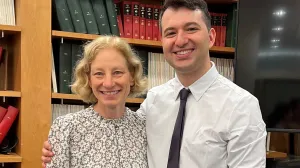
When the last bell rang at the Fisher-Mitchell Elementary School in Bath, Maine, about 140 miles north of Boston, Sean Paulhus would hurry home as quickly as he could. But he wouldn’t stop at his house. He’d continue down the street to spend an hour with his grandfather every afternoon.
Albert Plummer loved his grandson, and the feeling was mutual. They would watch old movies together – everything from Westerns to Battlestar Galactica – and Albert read Sean books, told him stories and shared his love of history. Weekends included family camping excursions and trips to Washington D.C., Plymouth Plantation and the ancestral homes of Calvin Coolidge and Ethan Allen. Many of Sean’s fondest memories from his childhood were spent with his grandfather. And to this day, Sean is particularly grateful for those special moments, because they very nearly never happened.
Failing health
Albert Plummer didn’t exactly live a healthy lifestyle. His favorite foods were meat and potatoes, he smoked and he was not overly active. And genetics were not in his favor either – his brother, Frank, would suffer a fatal heart attack at age 49. By the time he reached his mid-40s, Albert’s body began to betray him. In 1982, he sustained a serious back injury while on the job. A spinal fusion was unsuccessful and prevented Albert from returning to work. He had a minor heart attack in 1984 and was scheduled for bypass surgery when, on July 4, 1985, Albert suffered a massive heart attack – also at age 49 – while on a family camping trip. He survived, but with his heart failing and treatment options dwindling, Albert’s doctors told him to go home and get his affairs in order.
“They were resigned to the fact that he was going to die,” said Diane Plummer, Albert’s wife. “Albert was never afraid of dying, but he was willing to try everything to keep on living. One day, I came home from work and he looked at me and said, ‘I wonder if I can get a heart transplant?’”
Preparing for transplant
In 1985, a heart transplant procedure was as risky as it was uncommon. But that didn’t deter an ambitious group of cardiologists and cardiac surgeons at Tufts MC (then known as New England Medical Center) in Boston.
Several years earlier, a young cardiologist named Marvin Konstam, MD, had founded a heart failure program at Tufts MC. Dr. Konstam and Deeb Salem, MD, the Director of the Cardiac Catheterization Laboratory, saw patients in the clinic and helped them manage their condition. This specialized care – which was not widely available at the time – immediately became in high demand with heart failure patients.
The instant success of the heart failure program, coupled with a skilled and experienced cardiac surgery team and a clear patient need, convinced Dr. Salem, Dr. Konstam and their colleagues that the time was right to make a foray into heart transplant.
The preparations began in early 1984. In the middle of that year, a team led by Dr. Salem traveled across the country to Stanford University Medical Center for an intense, week-long training on the protocols and medical management of heart transplant patients, with the preeminent heart transplant team in the country at the time. They came back very excited, but fully aware of the challenges that would lie ahead.
“There was a tremendous learning curve in both surgery and medicine,” said Dr. Konstam, who today serves as Chief Physician Executive of the CardioVascular Center at Tufts MC. “We had to learn how to use new drugs, master new surgical techniques and closely monitor kidney function. But the biggest challenge was a moral one – determining who would receive such a precious, but limited, resource. We had to learn to offer hearts only to patients with both the greatest need and the highest probability of short- and long-term success.”
A race against the clock
Albert Plummer checked both boxes. After one local cardiologist told him that his back injury and prior history of smoking would preclude him from being eligible for a new heart, a second opinion led to a connection with Dr. Konstam. By this point, it was October, 1985, and Tufts MC had been preparing for more than a year and a half to perform its first heart transplant. The team just needed the right patient and a matching heart. But for Albert, time was running out. He was put at the top of the heart transplant list and was admitted to Tufts MC, where he was hooked up to oxygen around the clock.
“By that point he was on death’s door,” said Diane. “But Albert never felt sorry for himself or lost his sense of humor. I remember he shared a hospital room with a man who needed a liver transplant. One day I came to visit and found him playing cribbage with his roommate for each other’s healthy organs!”
“Albert was the ideal patient,” said Dr. Salem, “He had an ideal outlook on life and an extremely supportive family, which are both so important in keeping hope and maintaining the motivation to continue fighting.”
A landmark heart transplant
Albert’s positive attitude and will to live paid off. Incredibly, just two weeks after he was admitted to the hospital, a matching heart became available. The first-ever heart transplant at Tufts MC took place on October 30, 1985. Dr. Konstam and Dr. Salem were in the operating room to observe the milestone procedure.
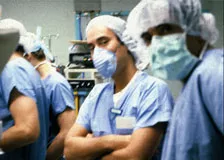
“There was not much medically for us to contribute,” admitted Dr. Salem. “But we had to be there.”
Everything went smoothly and as expected.
“When the cardiac surgeons removed my dad’s heart, they found that it was working at only eight percent capacity; they didn’t know how it was still functioning,” said Albert’s daughter, Michelle Peck. “But as soon as they put the new heart in his chest, it was completely in sync. The heartbeat was so strong.”
In addition to becoming the first-ever heart transplant recipient at Tufts Medical Center, Albert was only the second Maine resident to receive a new heart.
“We were walking on water,” said Dr. Konstam. “We had gone through so much planning and preparation to get to the point of our first transplant. It was absolutely thrilling that it was such an enormous success.”
“All the doctors, surgeons and staff were so wonderful,” said Michelle. “They gave me my dad back. He called them ‘a hospital with a heart.’”
A second chance at lifelong memories
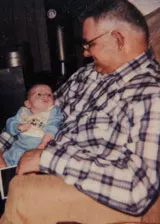
Albert spent seven weeks recovering at Tufts MC before he was discharged in mid-December, 1985. Once back home in Bath, Albert was able to resume the life he enjoyed, with minimal limitations. He was able to go camping again, see friends, spend time with family and enjoy the extra life he had been gifted.
And his family kept giving him milestones to strive for and events to celebrate, starting almost immediately with the birth of his first grandchild on December 23, 1985 – less than two weeks after Albert came home from the hospital. It had been his goal to be with Michelle in Connecticut the day baby Sean was born. And thanks to his new heart, he was there.
Over the next 11 years, Albert attended the weddings of both his children, Michelle and PJ, was present for the birth of a second grandchild, Michelle’s daughter Staci, in 1994, and celebrated his 50th and 60th birthdays and his 25th and 30th wedding anniversaries. But, after tolerating his new heart for more than a decade, Albert developed a delayed form of transplant rejection that caused coronary artery blockage and led to a heart attack. He died of the resulting heart failure on November 15, 1996 – 11 years and 16 days after his heart transplant.
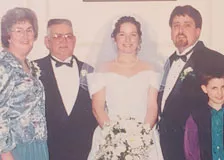
“His last 11 years were the happiest of our 33-year marriage,” said Diane. “There was more gratitude for life and family during those years. I think we all realized what was really important, and grew closer and appreciated each other even more, as a result.”
“It was an honor to know Albert and it’s incredibly rewarding to see all the lives he enriched with the extra time he was given,” said Dr. Konstam. “It is stories like his that make everything we do worthwhile.”
Hindsight in 2020
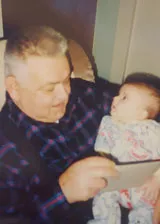
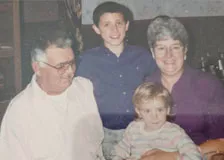
Today, Tufts MC boasts one of the busiest adult heart transplant programs in the country, consistently ranking among the top centers nationally in both volume and outcomes. Tufts MC set a New England record with 56 heart transplants in 2016 and has performed the most heart transplants in the region since 2000. Since Albert Plummer became heart transplant number one, Tufts MC has performed the procedure nearly 600 times.
As for Sean Paulhus, all those precious hours spent with his grandfather, reading books, telling stories and learning about history and politics, made a permanent impact. Today, Sean is a City Councilor in Bath, Maine; in 2019, he was elected to the Maine House of Representatives. Sean has a family of his own now, and his home – the very same house that Albert and Diane used to live in and that Sean used to run to after school every day – boasts an expansive library. It is rare to see him without a book in his hand.
“Sean could tell you everything you’d ever want to know about any U.S. president, including what color socks he wore,” said his grandmother, Diane Plummer. “It makes me smile. That was Albert.”
